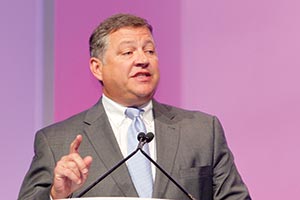Senior Reporter
Congress’ 2017 Transport Agenda Murky With Committee Leaders in Tight Races

This story appears in the Oct. 24 print edition of Transport Topics.
In this election cycle, senior transportation policymakers, including House Transportation Chairman Bill Shuster (R-Pa.), Rep. Jeff Denham (R-Calif.), chairman of the Railroads subcommittee and Sen. Roy Blunt (R-Mo.), a senior member of the Commerce Committee, are scrambling to hold on to their seats.
For myriad reasons the incumbents are experiencing some resistance with constituents, and national political prognosticators say their races are tossups. This, despite having overwhelmingly more transportation experience and campaign contributions than their opponents.
The trucking sector has seen value in the incumbents’ senior posts.
According to the Center for Responsive Politics, the trucking industry has given Shuster’s campaign committee $113,750 during this election to help him secure Pennsylvania’s 9th Congressional District seat. While Shuster touts his committee’s passage of the landmark five-year FAST Act highway law in December, seen as a major win for freight stakeholders and the economy, his tea party-backed opponent, Democrat Art Halvorson, pledges to shrink the federal role in transportation if elected.
To Denham, the trucking industry has given his campaign committee $108,350 so he may hold on to California’s 10th District.
Denham has aggressively advanced proposals that would block states from enacting requirements related to meal and rest breaks for truckers, a highly important provision for American Trucking Associations. Denham’s Democratic challenger, Michael Eggman, has promoted infrastructure projects that would assist farmers and small business owners in the Golden State.
Blunt, whose campaign committee has received $101,600 from the trucking industry, helped advance reforms in the FAST Act to the Federal Motor Carrier Safety Administration from his post on the Commerce panel. His opponent, Democrat Jason Kander, has pledged to support infrastructure upgrades to assist farmers.
ATA’s political action committee has given $454,700 to federal candidates during this election, three-quarters of it going to Republicans, according to the Center for Responsive Politics.
The trade federation declined to comment for this article.
The incumbents also have received donations from industries, such as banking and health professionals. The Center for Responsive Politics did not have fundraising profiles for the challengers.
Republican leaders on Capitol Hill rooting for the incumbents to win in November are banking on their expertise to help carry out plans to establish a long-term funding fix for infrastructure projects as part of a tax reform package next year.
The top Republicans in the House and Senate have promised a tax reform package in 2017. And for them to make good on that promise, they need their members to return to Capitol Hill.
No matter who is elected in November, infrastructure advocates are asking Congress to press ahead with a long-term highway funding fix after the elections. The National Association of Manufacturers, in a recent report titled “Building to Win,” called for advancement of a pro-growth infrastructure agenda funded through such options as tax reform and a fee on miles traveled.
“We’re certainly going into 2017 with a very open mind. We’re not limiting ourselves and really want to be open-minded about what the possibilities are for the next Congress and the next administration. And, if there is an opportunity to do comprehensive tax reform and an opportunity to accomplish infrastructure, well, let’s see how they work together,” Robyn Boerstling, vice president of infrastructure, innovation and human resources policy at the National Association of Manufacturers, told Transport Topics on Oct. 19.
“Congress has had these discussions in the past on funding infrastructure. But it is time for Congress to return to this conversation and be serious about it. We’re OK with some general [Treasury] fund spending on infrastructure. But it’s also not the most sustainable way to fund infrastructure,” Boerstling added.
Todd Spencer, executive vice president of the Owner-Operator Independent Drivers Association, said his experience is that incumbents almost always are re-elected. Spencer added that OOIDA members come from every political leaning, and they will work on industry affairs with whomever is elected.

